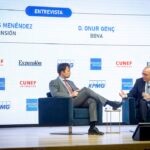Onur Genç (BBVA) is confident that take-up will easily exceed 50 percent and considers a second bid – at the same price – highly unlikely
BBVA CEO Onur Genç said on Tuesday that the acceptance period for the takeover bid for Banco Sabadell is progressing well ahead of expectations. Genç participated in the 16th Financial Meeting organized by KPMG and business daily Expansión in Madrid, where he emphasized the positive response from shareholders, both institutional and retail, who are backing the transaction. He reiterated his belief that BBVA will comfortably exceed the 50 percent acceptance threshold thanks to the financial appeal and strategic rationale of the offer. He also stressed that “waiting for a hypothetical second bid makes no sense, as it would be highly unlikely and would offer no advantages in terms of price, timing or taxation. Shareholders who do not tender their shares will be left out and will not benefit from the price being offered,” he said.

During his presentation, he emphasized that the majority of acceptances tend to come in during the final days of the period, as is customary in this type of public offering. In fact, in recent transactions in Italy and previous transactions in Spain, nearly 75 percent of acceptances were recorded in the last three days. “We are very pleased with what we are seeing these days," adding that "a clearly positive trend is already emerging,” he said.
While the data currently available is not yet final, BBVA’s CEO said the bank expects to significantly surpass the 50 percent threshold for two main reasons.
First, the reaction from different types of investors. “The vast majority, if not all active institutional investors (including also the so-called ‘arbitrageurs’), who represent around 30 percent of Sabadell’s share capital, are going to tender their shares as they base their decision on fundamentals,” he stated. A key figure for these investors is that they will receive 41 percent more earnings per share following the merger, compared to standalone Sabadell. “In other words, if you are currently earning €100 in profit, if you take up the offer, your earnings per share would increase to €141. They are professionals who see the rationale clearly and they are going to tender their shares,” he added.
Regarding passive institutional investors, who represent around 20 percent of Sabadell’s share capital, he noted that “they own Sabadell shares as part of an index, for example, the Spanish Ibex 35. These investors tender their shares based on the level of acceptance they expect. If they think we will reach 60 percent, they participate in that proportion. Moreover, they have a positive bias,” he said.
As for retail investors, who make up about 40 percent of the share capital, he said: “We will see how things evolve over the next few days, but we have added a key improvement. Even if the custodian is another bank, like Sabadell, we are allowing retail shareholders to participate in the offer at BBVA branches, whether or not they are BBVA customers, completely free of charge.” In addition to this convenience, along with the decision made by David Martínez – Board Member and the largest individual shareholder of Sabadell with around four percent – we are seeing that the number of shareholders taking up the offer has accelerated.” On this point, he added: If the offer is good for all institutional investors and for Sabadell’s largest individual shareholder, it is also good for the rest of the shareholders.
Additionally, Genç explained that “BBVA is the custodian for around two percent of Sabadell’s shares, which allows it to track the data daily. “We expect to be at 40 percent of acceptances among this group of shareholders by the end of the day.”

Financial appeal for shareholders and a strategically sound consolidation
The BBVA CEO reiterated his confidence in the success of the offer and its appeal to Banco Sabadell shareholders. Since the beginning of talks in April 2024, Sabadell’s share price has more than doubled, reaching all-time high levels. “Five years ago, Sabadell’s market value was €2 billion. We are now offering over €17 billion, its highest value ever. In our opinion, Sabadell shares have no longer upside and everyone wants to cash in its shares taking advantage at these peak levels. Furthermore, following the merger, earnings per share will also increase by 41 percent through the transaction,” he added.
Genç also pointed to the nature of the transaction: consolidation within the same market. “Instead of having two mobile banking apps and double the cost, we will only have one, saving approximately €900 million per year before taxes. These savings “are highly significant,” he emphasized. For all these reasons, BBVA’s CEO encouraged “all shareholders to take up the offer: go to a BBVA branch to do so. If not, they will miss out on the opportunity and will not be able to benefit from our offer.”
No sense in waiting for a second bid
The CEO recalled that BBVA has the legal option to lower the minimum acceptance threshold. “We believe that we will exceed the 50 percent threshold,” so any discussion around the possibility of lowering the threshold or a second bid is a very unlikely scenario,” he noted.
In this sense, he explained that if BBVA surpasses 50 percent of Sabadell voting rights “there will be no second takeover bid and the shareholders who did not take up the offer are left out, not benefiting from the price we offered. Hypothetically, this could only happen if the level of acceptance were between 30 and 50 percent.”
Regarding the price of a hypothetical second bid, Genç was unequivocal: “What’s happening in the market is not acceptable and what Sabadell is saying is not correct.” The BBVA CEO explained that all the information is in the prospectus, the legal document governing the transaction. On page 53, it refers to Article 9.2.e (of the Royal Decree of Takeovers), which determines the fair price in a takeover bid following a prior acquisition via a share exchange, is determined in accordance with Article 9.1, as underscored by Onur Genç in his remarks. This article stipulates that the price of a second takeover bid—should one be launched, which is highly unlikely—would be the highest price paid by BBVA for Sabadell shares over the past 12 months. As BBVA has not acquired any shares outside the current offer, “the price of a hypothetical second bid would be identical to that of the current offer. It would not differ under any circumstances.”
In short, “if the price is the same, why wait?”, he asked. “We should ask why others are encouraging shareholders to wait. There is no doubt: it is better to accept now. Waiting makes no sense.” Genç insisted that a hypothetical second offer may never exist and it would not bring any advantages — in terms of price, timing, or taxation.